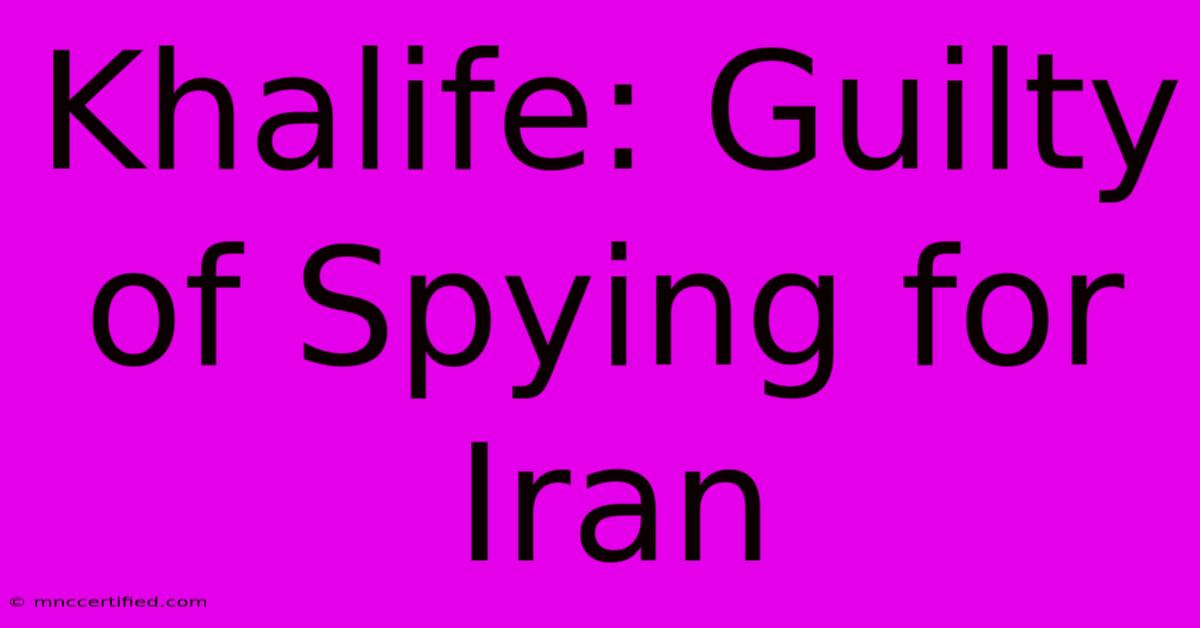Khalife: Guilty Of Spying For Iran

Table of Contents
Khalife: Guilty of Spying for Iran – A Deep Dive into the Case
The case of Daniel Khalife, the British soldier accused of spying for Iran, has captivated the nation and sparked intense debate. This article delves into the details of the accusations, the evidence presented, and the implications of this high-profile case. We’ll explore the charges, the potential penalties, and the ongoing investigation, while maintaining a focus on factual accuracy and avoiding speculation.
The Charges Against Daniel Khalife
Daniel Khalife, a former member of the British Army, faces multiple charges related to espionage and breaches of security. The most serious accusation is spying for Iran, a charge carrying a potential life sentence. Specifically, the prosecution alleges Khalife:
- Gathered information: The prosecution claims Khalife illicitly gathered sensitive information pertaining to national security, potentially compromising crucial defense systems and intelligence operations. The exact nature of this information remains largely undisclosed to protect ongoing investigations and national security.
- Breached security protocols: Khalife is accused of violating strict security protocols within the British Army. This includes unauthorized access to classified data and potentially compromising the integrity of secure systems.
- Aided the enemy: The core charge centers on the allegation that Khalife provided this sensitive information to a hostile foreign power, namely Iran. This action is considered a grave act of treason under British law.
Evidence Presented (Without Compromising National Security)
While details remain classified to protect national security, the prosecution is believed to have presented a range of evidence, including:
- Digital evidence: This likely includes computer logs, communications data, and potentially recovered encrypted files suggesting contact with Iranian intelligence operatives.
- Witness testimonies: The prosecution may have relied on testimonies from colleagues, superiors, and potentially intelligence agents involved in the investigation.
- Physical evidence: This could include documents or materials recovered from Khalife's possession, though specifics are unlikely to be made public.
It's crucial to remember that the details of the evidence remain largely confidential, and this summary is based on publicly available information. The full extent of the evidence will only be revealed during a full and open trial.
The Implications and Fallout
The Khalife case has significant implications for national security and public trust in the armed forces. The potential breach of sensitive information raises serious concerns about vulnerabilities within the British Army's security protocols. The government has launched a full-scale review of its security procedures to prevent future incidents.
The case has also sparked debate about:
- The effectiveness of security clearances: The case highlights the need for rigorous vetting processes and continuous monitoring of personnel with access to sensitive information.
- The threat posed by foreign intelligence agencies: The alleged Iranian involvement underscores the persistent threat posed by hostile foreign powers seeking to compromise British national security.
- The penalties for espionage: The potential life sentence underscores the gravity of the charges and serves as a deterrent to future acts of espionage.
The Ongoing Investigation and Future Proceedings
The investigation into Khalife's activities is ongoing, and further details are likely to emerge during the trial. The prosecution will need to present compelling evidence to secure a conviction. The defense will undoubtedly challenge the evidence and argue for a different interpretation of the facts. The outcome of the case will have far-reaching consequences for both Khalife and the UK's national security apparatus.
It's important to note: This article provides an overview of the case based on publicly available information. All individuals are presumed innocent until proven guilty in a court of law. This article does not aim to pre-judge the outcome of the trial but rather to offer a factual account of the situation based on current knowledge. Further updates will be provided as the case progresses.
Keywords: Daniel Khalife, Iran, spying, espionage, British Army, national security, treason, intelligence, security breach, trial, investigation, foreign intelligence, security clearance.

Thank you for visiting our website wich cover about Khalife: Guilty Of Spying For Iran. We hope the information provided has been useful to you. Feel free to contact us if you have any questions or need further assistance. See you next time and dont miss to bookmark.
Featured Posts
-
Dental Insurance Falls Church
Nov 29, 2024
-
Hattons Photos A Royal Patron
Nov 29, 2024
-
Understanding The National Dog Show
Nov 29, 2024
-
Thanksgiving Starbucks Find Florida Locations
Nov 29, 2024
-
Thanksgiving Nfl Special Game Patches
Nov 29, 2024